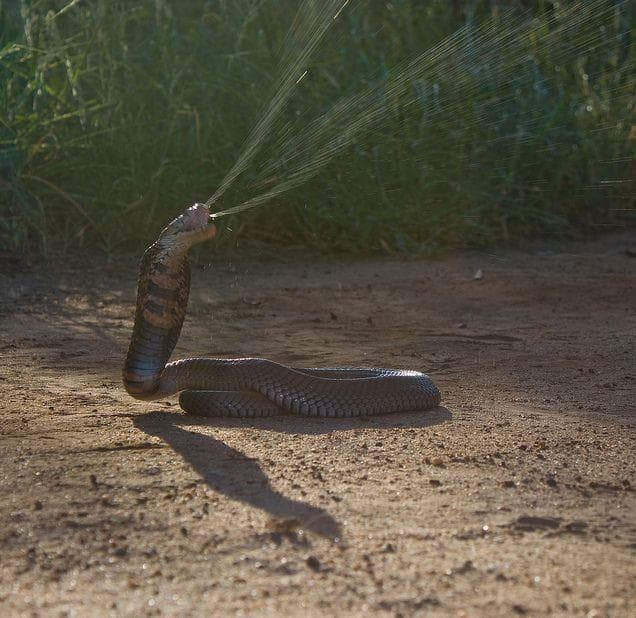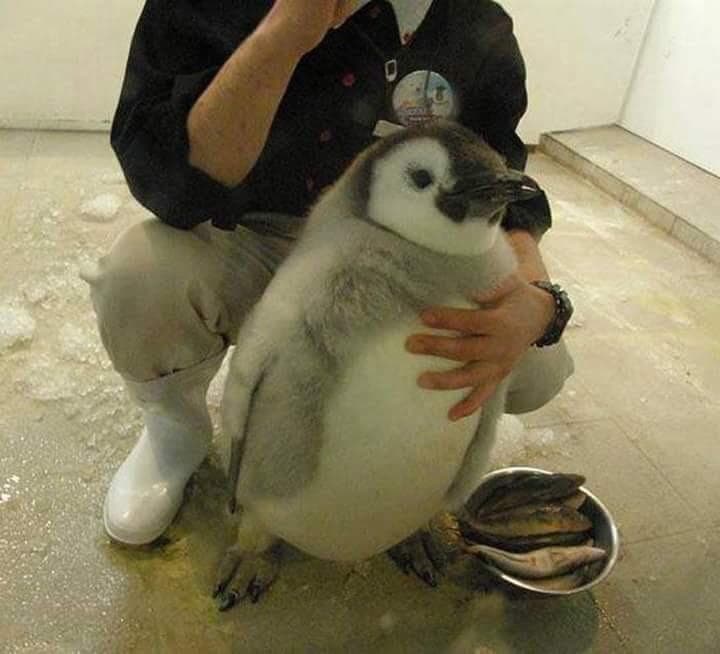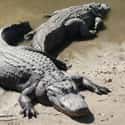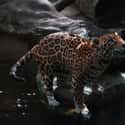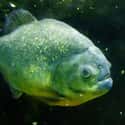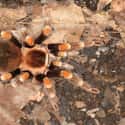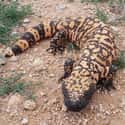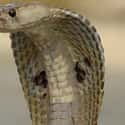-
(#1) Fennec
- Vulpes zerda
Fennec Foxes are arguably the cutest little predators you can own as a pet. These big-eared little critters are the smallest species of fox, and they have been domesticated for use in the pet trade.
Fennec Foxes are opportunistic eaters, so they're okay eating just about anything that crosses their path. They will forage for edible plants, but they're just as happy snacking on eggs, reptiles, rodents, and insects.
They aren't the most ferocious of predators out there, and there's virtually no chance your pet Fennec Fox will try to eat you. Still, they might terrify any rodents that wander into your home.
They are considered exotic pets, so they may not be allowed in your area. Minnesota, Missouri, Nevada, and Washington don't allow people to keep them. In contrast, Florida, Indiana, Illinois, Michigan, and Texas allow it, but with a permit.
-
(#2) Gray Wolf
- Canis lupus
Technically, cats and dogs are predators, but they've been domesticated. The progenitor species of all domesticated dogs, the Gray Wolf, has not been domesticated. Regardless, they are allowed to b kept as pets in some places, though keeping them requires a great deal of care and understanding of their needs.
After all, wolves are pack animals, so they need to have a lot of love and attention, but putting them into a home with dogs probably won't fit this need... and it will probably lead to the death of the dogs!
Wolves require a lot more room to run around than a domesticated dog. A typical wolf will need to move around a ten to 15 square mile area to maintain their health and fitness.
Wolf puppies are socialized with people after about 16 weeks, and in the early stages, they are similar to dogs. When they grow up though, that's a different story. Wolves get large, and they require more food. Kibble won't keep them healthy like a dog, so you'll need to feed them cuts of raw meat. Other than that, they can be trained and kept safely, but at the end of the day, they're still a wild animal, so keep that in mind if you want to get one. Additionally, it's illegal in most places to keep wolves as pets, so check your local laws before attempting to acquire one.
-
(#3) Alligator
- Alligator
If the mood strikes you to pick up a large reptile and an iguana isn't going to cut it, it is legal — in some areas — to own an alligator. Crocodiles are also available, but gators are far more common in the west. Keeping an alligator isn't easy, as they require specific living conditions to keep them happy and healthy.
You need to have a large semi-aquatic space where they can fully submerge themselves or lay out in the sun. An average adult alligator grows to around 11 feet long and can weigh in at 1,000 lbs. They are not for the faint of heart. The good news is, your cuddly friend will live for up to 50 years if properly cared for, so they'll be around a lot longer than most pets.
Feeding an alligator isn't exactly easy. You need to give them a lot of raw meat on a semi-weekly basis. The best way to do this is to put a chicken on the end of a long pole and give it to the gator. Gators tend to eat every 5-6 days, and they will need around seven lbs. of meat at each feeding, so they don't require as much food as some of the other predators on this list.
-
(#4) Tiger
- Panthera tigris
The sad fact about keeping tigers as pets is that more live in captivity as pets than they do in the wild. Around 5,000 tigers live in captivity, many of them in the United States. According to the World Wildlife Fund, less than 4,000 tigers live in the wild.
It is legal in a lot of states to own a tiger as a pet, and if you've seen The Hangover, you know that Mike Tyson had one. He really did. Caring for a tiger is expensive, and they can eat upwards of 90 lbs. of raw meat in one sitting. More than that, you can't keep a tiger in your back yard and think that's adequate. They need around 40 square miles of roaming territory, or they will become frustrated and could attack people.
When they're cared for properly, tigers can be downright docile around humans. That's especially true if the tiger is loved and well-fed such that they don't have to hunt. They end up becoming large docile cats. That makes for a good pet, but they need a lot of time and attention, so any change in your behavior toward them could prove dangerous.
-
(#5) Cougar
- Puma concolor
Depending on where you live, these big cats have different names, but they're all the same species. It is possible to tame a cougar, but don't ever lull yourself into the belief that they are domesticated — they most certainly are not. Still, it is legal to keep them as pets in some areas, and doing so requires a great deal of time and money.
Only three states, Alabama, Nevada, and Wisconsin, allow for the ownership of a cougar without a permit. Other states do require permits and may limit ownership, so check your local laws before you get one. They do eat a lot of raw meat, so make sure you can afford to feed them before thinking about bringing one into your home.
Cougars tend to make for playful pets, and in many ways, they are like giant versions of regular domestic cats. There are some differences, and they come in the form of incredibly long, sharp claws, and teeth. A playful tabby cat might scratch you, but a playful cougar scratch could send you to the hospital.
-
(#6) California grizzly bear
- Ursus arctos californicus
If you're in the market for an animal that can grow to 1,500 lbs, a bear might be the pet for you. There are a lot of different species of bears, and not all of them make for good pets... to be clear, none of them make for good pets, but that hasn't stopped people from trying. Bears can be trained, but they aren't domesticated animals, and an angry one has no problem taking down a full-grown person.
Bears are technically predators, but meat makes up only a small portion of their diets. Depending on the species, they may subsist almost entirely on berries and other vegetation they forage while preparing to hibernate.
Most nations do not allow for the ownership of a bear, but there are some places and several exceptions. To have one in places like Indiana or Alabama, you're going to need a special permit, and they aren't often given to people just looking for a pet. They are most often approved for people who work with bears, which can include animal actor specialists, veterinarians, circus performers, and the like.
-
(#7) Jaguar
- Panthera onca
Jaguars are rather large wild cats that should not be kept as pets. That said, it is legal in some places to keep them as pets, though they require a great deal of care. Jaguars are able to take down adult crocodiles, so they're not to be trifled with.
A jaguar requires a great deal of land to roam, and like tigers and lions, they eat a lot of meat. In the wild, a jaguar will eat as much as 50 lbs. of food when they feed if there isn't a regular supply. In captivity, they eat less, but they can still consume around 30 lbs. of raw meat at every feeding.
That costs a lot of money, and given the space requirements to keep them happy, most people can't keep them properly as pets. Like other big cats, jaguars aren't domesticated, but they can be tamed to a certain point.
They might be fine around their primary caregiver but won't show any love or affection to anyone else. Few places allow people to own jaguars, but they are legal if they are registered in Missouri and Texas.
-
(#8) African lion
Owning a lion is an expensive investment due to their eating requirements. You will have to give them around ten to twenty pounds of raw meat each and every day. Costs to care for a lion can exceed $100,000/year, which includes food, water, and veterinary care (you'll need a specialist). They typically sleep for 20 hours a day, so you won't have a lot of time to spend with your cuddly kitty, but owning a lion is more about — owning a lion — than it is about having a pet.
Lions are extremely dangerous, so the best way to incorporate one into your home is to get it as a cub. They need to be raised by humans from birth, if possible, or they won't necessarily lose their interest in eating you.
Owning a lion is legal in a lot of places around the world, but you'll definitely want to check your local laws before making a purchase. Lions are allowed in some states, including Alabama, Delaware, Idaho, Mississippi, Missouri, North Dakota, Oklahoma, Pennsylvania, Rhode Island, South Dakota, and Wisconsin. Most states require a permit, so owning a lion there isn't necessarily a guarantee.
-
(#9) Piranha
- Piranha
Piranhas are some of the most notorious freshwater fish, so people naturally want to drop them into their aquariums. Their depiction in the movies doesn't really match up to reality, and while they do eat meat voraciously, they are predominantly active at night, and may not be as interesting as you initially thought.
It is legal to own Red-Bellied Piranha in most places, but it is often highly regulated. One of the principal concerns is that people will put them in lakes and rivers, making them a dangerous invasive species. Kept in the home though, and it's a rather interesting fish.
You can't keep these fish with other species of fish unless they are feeders... for obvious reasons. They are predators and will eat anything that swims along. Piranha are omnivorous and do require some of the same foods other fish eat. Worms and raw veggies like potato, zucchini, and spinach are a favored snack. Of course, you can drop in a chunk of raw beef or chicken as a tasty snack. Don't feed them something like goldfish -- if you want to feed your piranha a live fish, make sure it's one that they would normally eat in the wild, or you could cause serious gastrointestinal problems!
One other point of interest: piranhas are expensive. You can expect to pay around $500 for one fish, and seeing as they do best while schooling, getting a good number of them into a tank is going to cost a lot of money.
-
(#10) Tarantula
- Theraphosidae
Like all spiders, tarantulas are predators, and there are numerous species that all hunt a variety of prey. There are those that hunt small birds and others that routinely feast on lizards and other small animals.
While tarantulas are definitely predators, they pose almost no risk to humans, which is why they make for great pets. A bite will certainly hurt and swell, but unless there's an allergic problem, a bite won't result in serious complications. Also, pet tarantulas who are regularly handled and cared for rarely bite anyone, as they are surprisingly docile animals.
Most pet tarantulas will remain hidden between feedings, as they don't tend to use up much energy unless they are eating. They like dark places and will eat all manner of live critters you put in front of them. This can include crickets, mealworms, and roaches.
-
(#11) Boa
- Boidae
All species of snake are predators, but the one that winds up in most people's homes is the Boa Constrictor. There are several species, and also Pythons that take up a lot of terrariums around the world, but the Boa is the pet of champions. The snakes live long lives, and if they are well-cared for, they make for docile and friendly pets.
Feeding a Boa Constrictor is a bit different for a captive animal than it is for them in the wild. Pet Boas are usually fed pre-killed rats and mice, whereas a wild animal will hunt and kill its own food.
So long as they're well-fed and cared for, they make for amazing pets you can take on the go (in some places). Most states allow for their sale in the pet trade, so they aren't as exotic as they once were.
Caring for a large snake requires a large enough enclosure to keep them comfortable, but depending on the size of the snake, that's not necessarily a large space. You don't want to keep them in glass cages as this makes regulating their heat and humidity a challenge, but other than that, they are surprisingly easy to care for.
-
(#12) Wolverine
- Gulo gulo
There's a reason Marvel Comics' most aggressive character is named after this small North American critter. Wolverines are vicious, and they have never been domesticated. They are solitary animals that look somewhat like a cross between a small bear and a dog.
Their ferocity makes it possible for them to take down animals larger than themselves, so they are a real "handle with extreme caution" sort of animal. It's atypical, but there are a few places where owning a wolverine as a pet is legal, though it's not advised by anyone who doesn't have a great deal of experience working with them.
Wolverines are omnivorous, so they eat a lot of vegetation, but prefer meat whenever they can find it. In the wild, they eat caribou, moose, and mountain goats, but they are equally satisfied eating squirrels, rodents, and bird eggs. Wolverines tend to wander upwards of 15 miles in a 24-hour period, so they require a lot of land to remain happy.
-
(#13) Hyena
- Hyaenidae
While hyenas are more than happy to snack on whatever carcass they come across, they are actually decent hunters and will kill a prey animal should the need arise. To accomplish this, they function much like a pack of wolves and work together to ensure a kill is accomplished. Of course, a lone hyena has no problem stalking and killing prey, but they are social animals.
Hyenas are notoriously difficult to tame, and while you can keep them as pets in some locations, you can never fully trust them. If they are hungry and see something small and easily killed, they will take advantage, so they can't be trusted around other pets (smaller than them) or children.
There is one major reason why owning a hyena isn't a great idea. Hyenas emit a powerful odor known as "hyena butter," which is secreted from their anal glands. They smear it on anything within their territory to mark it, so be prepared for a stinky animal. Additionally, hyenas require a large amount of land to roam, or they can become frustrated and lash out at humans.
-
(#14) Gila monster
- Heloderma suspectum
Gila Monsters are the only species of venomous lizard native to the United States. They are predators who enjoy subsisting on small birds, mammals, other lizards, frogs, insects, and carrion. They love bird and reptile eggs, but they don't eat often, so keeping one as a pet doesn't require as much food as many of the other animals on this list.
A Gila Monster eats only about five to ten times a year in the wild, but when it does feed, it can eat as much as one-third of its body weight. They are slow-moving animals and don't typically require a large area, so keeping them as pets isn't too difficult.
Most states don't allow the keeping of Gila Monsters without a permit, or at all. Their venom is as toxic as a Western diamondback rattlesnake, but it doesn't produce large amounts of it, so a bite won't kill a human. It could endanger a small child, and their bites only kill adults in the wild when intoxication is a factor.
Their venom toxicity is what keeps them on lists of animals that aren't allowed in some states, but that doesn't mean they aren't good pets. So long as you are careful in handling them, they can be an interesting and exotic pet. They do have a quick and powerful bite, so caution is the name of the game.
-
(#15) Cobra
If your interest in keeping a snake delves into the more dangerous fare, it is possible in some places to keep a venomous snake as a pet. There are a ton of options regarding the type of snake you can keep, and every state and country has different regulations for them.
Because snake venom is so dangerous and can result in death, venomous snakes require a person with knowledge in maintaining their care. Novice snake-handlers shouldn't attempt to keep a King Cobra or Rattlesnake, or the results could be disastrous.
Most venomous snakes are aggressive towards humans, and they don't typically go anywhere near people in the wild. They will be in an unfamiliar setting in the home, so expect them to strike should you give them an opportunity to do so. Keeping a venomous snake isn't easy and getting the permits to do so is often time-consuming and difficult. If you're interested in getting one, do some research and prepare for a long fight with red tape.
New Random Displays Display All By Ranking
About This Tool
Predators are not always wild animals. With the rapid development of the domesticated animal industry, people can get more unique pets. Most people have no idea that the most common pets can actually be ferocious predators in wild nature. If you try to raise a predator as a pet, it is actually unfair to this animal and you must learn more about the raising knowledge.
Are you looking for some special pets? This interesting collection could give you inspiration. The random tool lists 15 predators people can own as a pet. However, each country has different laws and regulations on the protection of pets and wild animals, and legal parenting procedures are required.
Our data comes from Ranker, If you want to participate in the ranking of items displayed on this page, please click here.





